Ship Recycling is an essential process in managing end-of-life vessels, ensuring their safe dismantling and the recovery of valuable materials. Ship Breaking Companies and Ship Demolition services play a key role in this industry by providing eco-friendly and sustainable solutions. These experts follow strict environmental and safety standards to recycle ships efficiently, reducing the impact on both the environment and human health.
Ship recycling is carried out in five major regions worldwide. However, the majority of ship recycling activities take place in India, Bangladesh, and Turkey, where large-scale dismantling facilities are located. These countries have well-established shipbreaking yards that process a significant portion of decommissioned vessels from around the world.

The ship dismantling process is highly complex and must be conducted with extreme precision to ensure safety, efficiency, and environmental responsibility. Every stage, from decontamination to material recovery, requires strict adherence to international regulations and best practices.
One of the most critical aspects of ship recycling is the environmental impact. Proper disposal of hazardous materials such as asbestos, fuel residues, and chemicals is essential to prevent pollution and protect marine ecosystems. Additionally, occupational safety plays a vital role in the industry. Workers involved in the dismantling process must be provided with proper protective equipment and work under regulated conditions to minimize health and safety risks.
As the demand for sustainable ship recycling grows, international regulations like the Hong Kong Convention for the Safe and Environmentally Sound Recycling of Ships are being enforced to ensure environmentally friendly and safe recycling practices worldwide.
Ship demolition listings are advertisements where decommissioned or scrapped ships are offered for sale for recycling or dismantling purposes. These listings are typically posted by ship owners or relevant companies to connect with potential buyers who specialize in shipbreaking. The listings generally include details about the ship’s technical specifications, age, condition, and the materials that can be recovered during the recycling process.
Discover reliable Ship Recycling Companies, Ship Demolition Companies, and Ship Breaking Companies that provide eco-friendly and sustainable solutions for dismantling decommissioned vessels. These professionals specialize in safely removing hazardous materials and recovering valuable metals like steel, copper, and aluminum, all while following international safety and environmental standards. Whether you require expert ship breaking services or efficient ship demolition solutions, our platform connects you with trusted companies dedicated to minimizing environmental impact and supporting the circular economy.
The ship recycling process consists of several essential stages to ensure the safe and environmentally responsible dismantling of decommissioned vessels. It begins with the pre-arrival assessment, where the ship's documentation, ownership records, and hazardous material inventory are reviewed to comply with international regulations.
Upon arrival at the recycling yard, the pre-cleaning phase takes place, involving the removal of hazardous substances such as fuel residues, oil, asbestos, and PCBs to prevent environmental contamination. Once the ship is safely secured, the structural dismantling phase starts, where large sections of the hull, deck, and superstructure are cut and removed using specialized equipment.
During this stage, materials like steel, aluminum, and copper are separated for recycling, while non-recyclable waste is safely disposed of according to environmental guidelines. The final stage involves thorough site cleaning and inspection to ensure all materials have been processed correctly, completing the ship recycling process in a manner that prioritizes sustainability, worker safety, and resource efficiency.
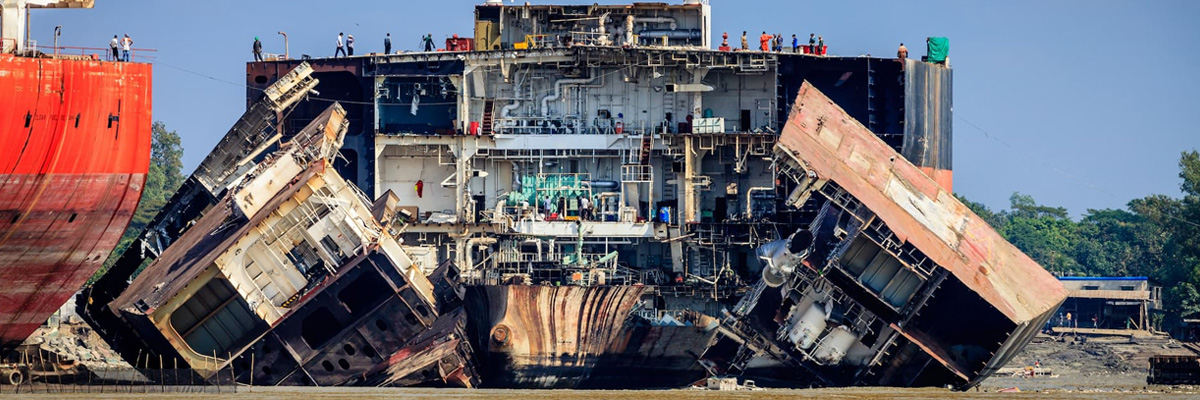
Ship recycling plays a crucial role in sustainability, resource conservation, and environmental protection by efficiently dismantling decommissioned vessels and repurposing valuable materials. The process significantly reduces the demand for raw materials such as steel, aluminum, and copper, thereby lowering energy consumption and minimizing the environmental impact of mining and metal production.
Additionally, proper ship recycling helps prevent hazardous substances like asbestos, fuel residues, and chemicals from polluting marine ecosystems and coastal areas.
It also contributes to the global economy by generating employment opportunities, particularly in major ship recycling hubs such as India, Bangladesh, Turkey, and Pakistan. Moreover, adherence to international regulations such as the Hong Kong Convention ensures safer and more environmentally responsible recycling practices, promoting both worker safety and ecological sustainability.
As the maritime industry grows, responsible ship recycling remains essential in reducing waste, preserving natural resources, and supporting a cleaner, more sustainable future.
The world’s leading ship recycling hubs include:
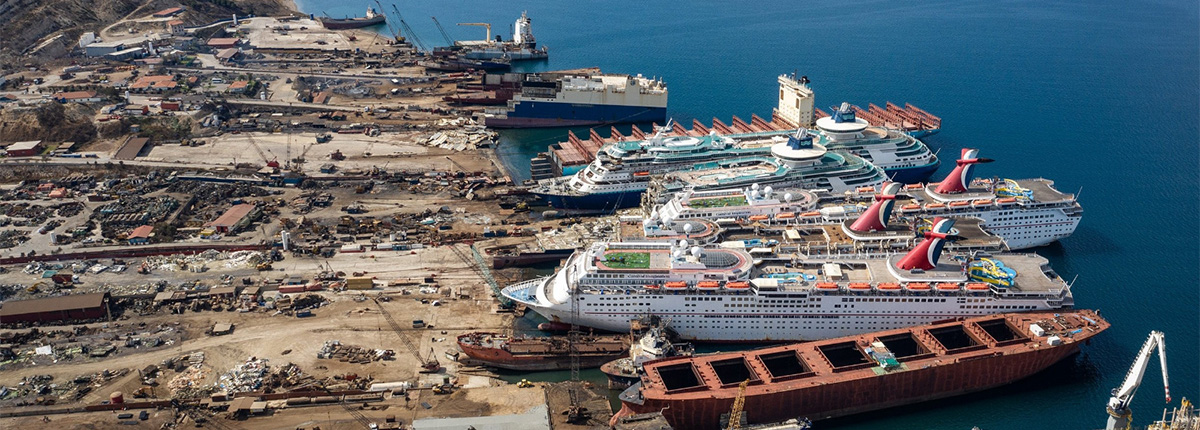
Aliağa, located on Turkey’s Aegean coast, is one of the world’s most important ship recycling centers. Every year, hundreds of end-of-life ships from around the world are brought to Aliağa for dismantling and recycling. The region’s shipbreaking yards play a crucial role in the global supply of recycled steel and other valuable materials.
The ship recycling process in Aliağa begins with the safe docking of vessels at designated yards. Before dismantling, hazardous materials such as fuel, oil, asbestos, and heavy metals are carefully removed to prevent environmental contamination. Once the ship is cleared of pollutants, the dismantling process begins, with different sections of the vessel cut and separated for further processing.
Recycled materials from ships, particularly steel, are sent to various industries for reuse. The steel recovered from shipbreaking is a valuable resource for construction, manufacturing, and infrastructure projects. Other materials, including copper, aluminum, and machinery parts, are also salvaged and repurposed. The process not only reduces the demand for newly mined raw materials but also supports the circular economy.
Environmental and safety regulations play a crucial role in Aliağa’s ship recycling industry. The yards must comply with international agreements such as the Hong Kong Convention, which promotes safe and environmentally sound ship recycling practices. Turkish authorities also enforce strict regulations to minimize pollution and ensure worker safety. Efforts are continuously made to improve sustainable recycling techniques and reduce the industry’s environmental impact.
The ship recycling industry in Aliağa contributes significantly to Turkey’s economy. It provides employment for thousands of workers and supports various sectors, including steel production, logistics, and metal processing. However, challenges such as managing hazardous waste, meeting international compliance standards, and improving recycling efficiency remain critical areas for development.
With growing global attention on sustainable ship recycling, Aliağa is expected to further modernize its facilities and implement more environmentally friendly methods. By investing in advanced technologies and maintaining strict regulatory standards, the region aims to strengthen its position as a leading hub for responsible ship dismantling and material recovery.
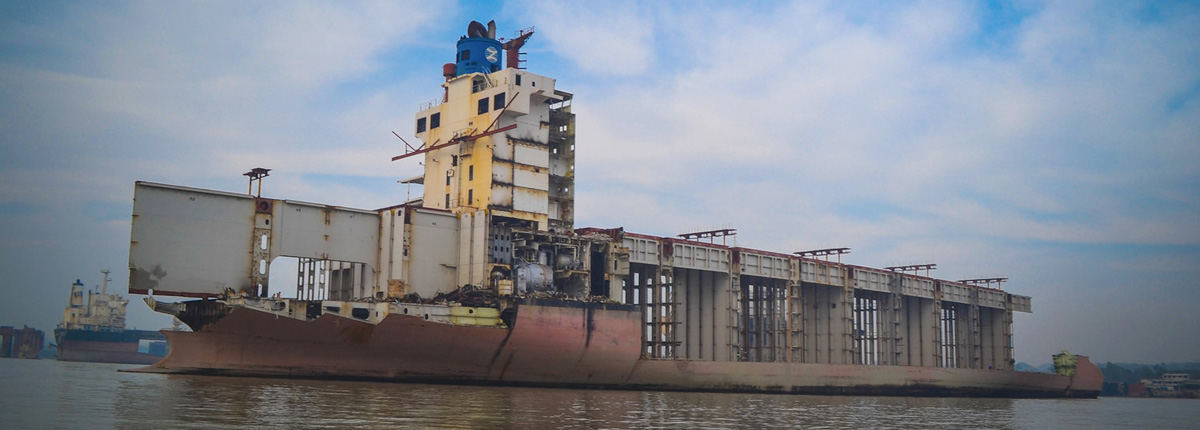
Alang, located on the western coast of India in the state of Gujarat, is one of the largest and most well-known ship recycling hubs in the world. For decades, Alang has been a focal point for dismantling end-of-life ships, making it an integral part of the global ship recycling industry. The Alang-Sosiya shipbreaking yard, a sprawling facility with thousands of workers, handles a significant portion of the world’s decommissioned vessels.
The ship recycling process in Alang begins with the arrival of ships at the yard, where they are safely beached on the shore. Once the vessels are secured, hazardous materials such as oil, fuel, and asbestos are removed to ensure environmental safety. This step is crucial, as improper handling of these materials can lead to serious pollution and health risks. After the ship is decontaminated, the dismantling process begins, where various components such as the hull, machinery, and metal parts are carefully separated.
The materials recovered during the recycling process, particularly steel, are sold and reused in various industries. Steel from decommissioned ships is an important resource for construction, infrastructure, and manufacturing industries. Other materials like copper, aluminum, and electrical components are also retrieved and resold. Alang’s yards play a significant role in the global supply of these materials, making ship recycling an economically valuable industry for both India and the global market.
Environmental and worker safety concerns have been significant challenges for the Alang shipbreaking industry. In the past, Alang faced criticism for its environmental impact and poor labor conditions. However, over the years, there have been improvements in the regulatory framework and safety measures. The Indian government, along with international organizations, has made efforts to improve the standards of ship recycling in Alang by implementing guidelines for hazardous waste management, worker safety, and environmental protection.
Alang’s ship recycling industry is subject to various international and national regulations, including the Hong Kong International Convention for the Safe and Environmentally Sound Recycling of Ships, which aims to protect human health and the environment during ship dismantling. The Basel Convention on hazardous waste also plays a role in regulating the handling and disposal of toxic substances found on ships.
Despite the improvements, challenges remain. The large number of ships processed annually in Alang, combined with the pressure to meet international environmental standards, continues to pose significant challenges. Efforts are being made to modernize the facilities, increase the use of advanced recycling technologies, and improve working conditions for the labor force.
Overall, Alang remains a key player in the global ship recycling market. As the industry continues to evolve, there is a growing focus on sustainability, worker welfare, and reducing the environmental footprint of shipbreaking operations. With ongoing investments in technology and regulatory compliance, Alang is positioned to remain a leading center for responsible ship recycling for years to come.
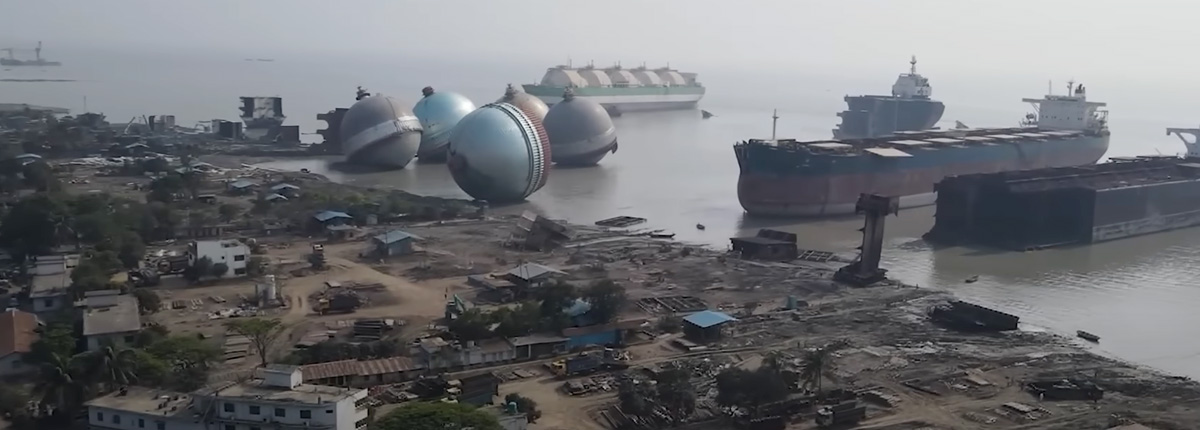
Chittagong, located in southeastern Bangladesh, is one of the most prominent and bustling ship recycling centers in the world. Its strategic location along the Bay of Bengal has made it a major hub for shipbreaking, where old, decommissioned vessels from all over the world are dismantled to recover valuable materials. The Chittagong Shipbreaking Yard, also known as Sitakunda, hosts hundreds of yards responsible for processing thousands of ships annually. This includes not only large cargo vessels but also oil tankers, passenger ships, and other marine vessels. The primary materials extracted from the ships include steel, aluminum, copper, and other metals, which are then recycled and sold for reuse in various industries such as construction, manufacturing, and infrastructure development.
However, while Chittagong’s ship recycling industry plays a significant role in the global economy by providing affordable raw materials, it has also been a source of controversy. The process of shipbreaking involves hazardous materials like asbestos, oil residues, and heavy metals, posing environmental and health risks for workers and surrounding communities. Workers are often exposed to dangerous conditions, including unsafe handling of toxic substances and the risk of accidents during the dismantling of large, heavy ships. Furthermore, inadequate waste management and disposal practices have led to concerns about pollution in the region, including oil spills and contamination of soil and water sources.
In response to these challenges, there have been efforts to improve working conditions and environmental standards in Chittagong’s ship recycling industry. The Bangladesh government has started to implement certain reforms, and there have been initiatives to encourage shipyards to comply with international conventions such as the Hong Kong Convention, which sets guidelines for the environmentally sound recycling of ships. Additionally, international buyers of scrap metal and vessels have begun pressuring the industry to adopt more sustainable practices that prioritize the safety of workers and the environment.
Despite these ongoing challenges, Chittagong remains one of the world’s most significant shipbreaking locations, providing jobs to thousands of workers and contributing to the global supply of recycled materials. The future of ship recycling in Chittagong hinges on the industry’s ability to balance economic benefits with improved safety and environmental practices, making it an area of focus for both local authorities and international organizations concerned with maritime sustainability.
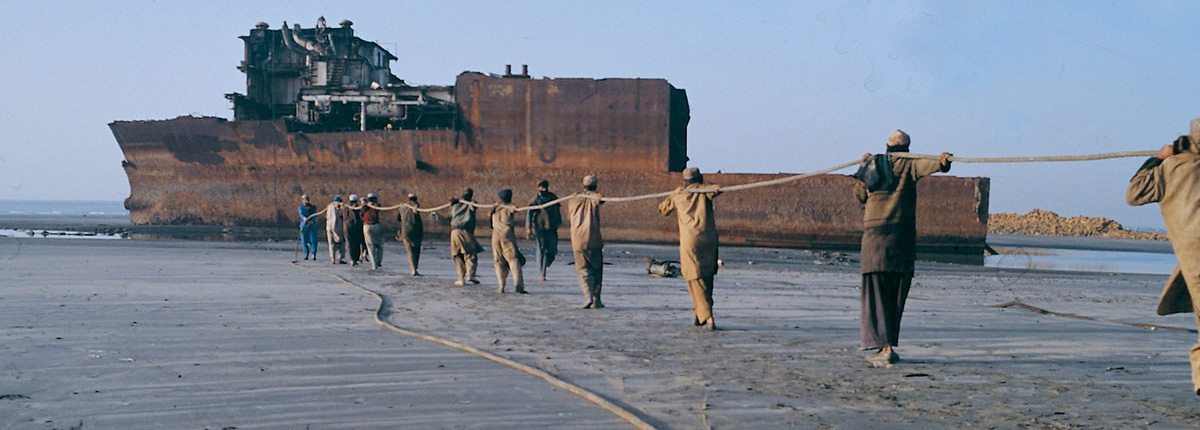
Gadani, located on Pakistan's southern coast near Karachi, stands as one of the largest and most active ship recycling centers globally. The Gadani shipbreaking yard processes a significant number of decommissioned vessels each year, including large oil tankers, cargo ships, and container vessels. Known for its ability to handle vast and heavy ships, Gadani plays a crucial role in the international ship recycling market.
The ship recycling process in Gadani begins when ships are brought to the beaching area, where they are grounded on the shore for dismantling. Before any dismantling work begins, the ships are thoroughly stripped of hazardous materials such as fuel, oil, and asbestos to prevent potential environmental harm. This step is essential for the safe recycling of the ship and the protection of workers and the surrounding ecosystem.
Once the hazardous materials are removed, the ship is cut into pieces, and the dismantling process begins. Workers separate valuable materials, primarily steel, which is sold for reuse in construction and manufacturing. Copper, aluminum, and various other metals are also recovered, alongside electronic components and machinery parts. Non-recyclable materials are appropriately disposed of to minimize environmental impact.
The ship recycling industry in Gadani has historically faced significant criticism due to safety concerns, harsh working conditions, and environmental issues. Many workers face risks because of inadequate safety measures, and in the past, the yards have been criticized for improper disposal of hazardous substances. However, over recent years, efforts to improve working conditions, introduce more sustainable practices, and comply with international regulations have been made.
Pakistan has taken steps toward aligning with international standards, including adherence to the Hong Kong International Convention for the safe and environmentally sound recycling of ships. The government has also worked on enforcing stricter environmental and worker safety regulations to improve conditions in the shipbreaking yards. Although progress has been made, there is still a need for continued investment in better facilities, enhanced safety practices, and eco-friendly technologies.
Gadani’s ship recycling industry remains a vital source of raw materials, especially steel, which plays an essential role in Pakistan's manufacturing and construction sectors. Despite the challenges it faces, including regulatory hurdles and modernization efforts, the shipbreaking industry in Gadani continues to be a major contributor to the global recycling ecosystem. With ongoing improvements in technology, regulation, and safety standards, Gadani is striving to balance its economic significance with environmental sustainability and better worker protection.
We use cookies to improve your experience. By continuing to use our site, you accept our Cookies, Privacy Policy,Terms and Conditions. Close X